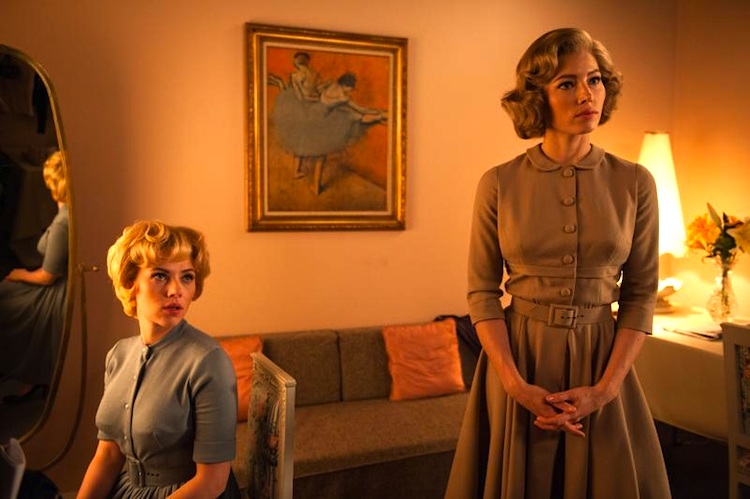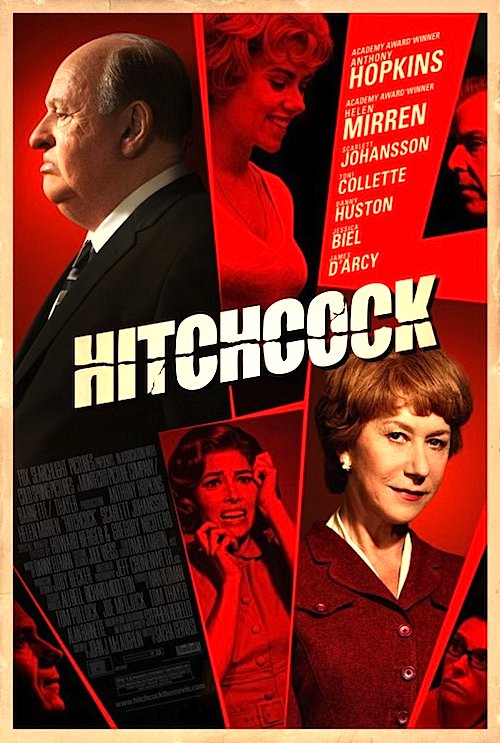
By Joe Bendel. Alfred Hitchcock, the master of suspense, largely self-financed his notorious 1960 classic, Psycho. He picked the right film to literally bet his home on. A spectacular success by any standard, the film that would introduce Norman Bates to the world looked like it might be his swan song during its rocky development and production stages. Dramatizing the behind-the-scenes story of arguably his most iconic work, Sacha Gervasi’s sympathetic but bitingly witty Hitchcock is now in award contention for at least one and possibly two of its accomplished leads.
Hitchcock is not a story Hitch would have made. Since we know Psycho was completed to his satisfaction and became a monster hit at the box office, there is not a lot of suspense to the tale. However, the getting from point A to point B is quite fascinating. As we meet Hitchcock and his patient wife Alma Reville, he is basking in the triumph of North by Northwest, which somewhat bores them both. As a distraction, Reville starts doctoring a new spec script written by Strangers on a Train screenwriter Whitfield Cook, who is hoping she will convince Hitchcock to attach himself to it. Of course, he has his mind set on very different property.
 Based on Robert Bloch’s novel, which in turn was inspired by Wisconsin serial killer Ed Gein, Psycho is the sort of film no respectable studio director would think of touching. That is exactly why Hitchcock is attracted to it. As the closing titles remind viewers, Hitchcock never won an Academy Award (a fact that could either help or hinder the film’s own Oscar campaign). Throughout Gervasi’s film, Hitchcock is clearly presented as a brilliant but ragingly insecure filmmaker. Resenting his lack of recognition, Psycho is convincingly framed as an effort to make an exploitation horror movie that is vastly superior to the prestige pictures the studios released. And so it was.
Based on Robert Bloch’s novel, which in turn was inspired by Wisconsin serial killer Ed Gein, Psycho is the sort of film no respectable studio director would think of touching. That is exactly why Hitchcock is attracted to it. As the closing titles remind viewers, Hitchcock never won an Academy Award (a fact that could either help or hinder the film’s own Oscar campaign). Throughout Gervasi’s film, Hitchcock is clearly presented as a brilliant but ragingly insecure filmmaker. Resenting his lack of recognition, Psycho is convincingly framed as an effort to make an exploitation horror movie that is vastly superior to the prestige pictures the studios released. And so it was.
Yes, this Hitchcock is somewhat neurotic and there is no denying his eye for blondes. Yet John J. McLaughlin’s screen treatment is refreshingly forgiving of his foibles. He was indeed a man of expensive tastes (taste being the most apt word), but the audience also sees Hitch and Alma puttering about the kitchen in slippers, like relatively down to earth people.
Both Sir Anthony Hopkins and Dame Helen Mirren are terrific as the first couple of suspense. As the title auteur, Hopkins is Hitchy without getting kitschy or shticky. Likewise, Mirren is the picture of mature sophistication as Reville. Listening to them bantering like an old familiar couple is one of the film’s great pleasures.
Yet the supporting work of Toni Collette and Scarlett Johansson really fleshes out the film, as it were. Collette’s smart, surprisingly attractive turn elevates what could easily have been the thankless role of the Hitchcock’s thankless assistant Peggy Robertson. Beyond being a spooky dead-ringer for Janet Leigh, Johansson also has some wonderful scenes with both principles that really deepen their humanity. While an Oscar campaign on her behalf might be pushing it, Hitchcock should definitely be on the bill for any future Johansson retrospective.
Gervasi commits a few missteps along the way, such as overplaying Hitchcock’s interior dialogues with the convicted and committed Ed Gein, perhaps hoping to throw genre diehards a bone. Still, the film pays off handsomely, especially for Hitchcock fans. In fact, you could say it has a real Hollywood ending. Deserving award consideration for the work of both Hopkins and Mirren, Hitchcock is recommended for the director’s admirers and those who enjoy films about the cinema. It is now playing nationwide, including at the AMC Empire in New York.
LFM GRADE: B+
Posted on December 26th, 2012 at 12:02pm.